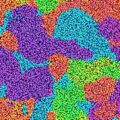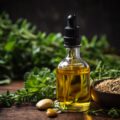Understanding Dry Scalp: Causes and Symptoms
A dry scalp can be an uncomfortable and often embarrassing condition that affects many people. It’s characterized by itching, flaking, and sometimes even pain or soreness. While it’s easy to confuse with dandruff, a dry scalp is actually caused by a lack of moisture in the skin, rather than an overgrowth of yeast. Common causes include cold weather, dehydration, harsh hair products, and certain skin conditions like eczema or psoriasis.
Symptoms of a dry scalp may include:
- Itching and irritation
- Small, white flakes of skin
- Tightness or discomfort
- Redness or inflammation
- Dry hair that’s prone to breakage
If you’re experiencing these symptoms, don’t worry – there are many natural remedies that can help soothe your scalp and restore moisture balance.
The Power of Natural Oils for Scalp Health
One of the most effective natural remedies for a dry scalp is the use of nourishing oils. These oils can help moisturize the skin, reduce inflammation, and even have antimicrobial properties. Some of the best oils for scalp health include:
- Coconut Oil: Known for its moisturizing and antimicrobial properties
- Jojoba Oil: Closely mimics our skin’s natural sebum
- Tea Tree Oil: Has powerful antifungal and antibacterial effects
- Argan Oil: Rich in vitamin E and fatty acids
- Olive Oil: Deeply moisturizing and full of antioxidants
To use these oils, simply warm a small amount in your hands and gently massage it into your scalp. Leave it on for at least 30 minutes or overnight for deep conditioning, then wash it out with a gentle shampoo.
Soothing Scalp Treatments with Kitchen Ingredients
Your kitchen is a treasure trove of natural remedies for dry scalp. Many common ingredients can be used to create nourishing and soothing treatments. Here are a few to try:
- Honey and Aloe Vera Mask: Mix equal parts raw honey and aloe vera gel. Apply to the scalp, leave for 20 minutes, then rinse.
- Apple Cider Vinegar Rinse: Mix 1 part apple cider vinegar with 3 parts water. Use as a final rinse after shampooing.
- Avocado and Banana Mask: Mash half an avocado with a ripe banana. Apply to scalp and hair, leave for 30 minutes, then rinse.
- Yogurt and Egg Treatment: Mix 1/2 cup plain yogurt with 1 beaten egg. Apply to scalp, leave for 20 minutes, then shampoo as usual.
These treatments not only moisturize but also provide nutrients that support overall scalp and hair health.
Lifestyle Changes for a Healthier Scalp
While topical treatments can provide relief, making certain lifestyle changes can help prevent dry scalp in the long term:
- Stay Hydrated: Drink plenty of water to keep your body and skin hydrated from the inside out.
- Eat a Balanced Diet: Include foods rich in omega-3 fatty acids, vitamins A and E, and zinc for optimal skin health.
- Reduce Stress: High stress levels can exacerbate skin conditions. Practice relaxation techniques like meditation or yoga.
- Use Gentle Hair Care Products: Avoid harsh shampoos and opt for sulfate-free, natural products.
- Limit Heat Styling: Excessive heat can dry out your scalp and hair. Use heat protectants and lower temperature settings when styling.
Remember, a healthy scalp is the foundation for healthy hair. By taking care of your scalp, you’re also promoting stronger, shinier hair.
When to Seek Professional Help
While natural remedies can be very effective for dry scalp, there are times when it’s best to consult a dermatologist or trichologist. Consider seeking professional help if:
- Your symptoms persist despite trying home remedies
- You experience severe itching or pain
- You notice signs of infection, such as oozing or crusting
- Your dry scalp is accompanied by significant hair loss
- You have a history of skin conditions like eczema or psoriasis
A healthcare professional can provide a proper diagnosis and recommend targeted treatments if needed.
Frequently Asked Questions about Dry Scalp
1. Can dry scalp cause hair loss?
While dry scalp itself doesn’t directly cause hair loss, the itching and scratching associated with it can lead to hair breakage and temporary hair loss. Treating the dry scalp can help prevent this issue.
2. How often should I wash my hair if I have a dry scalp?
It’s generally recommended to wash your hair 2-3 times a week if you have a dry scalp. Over-washing can strip the scalp of its natural oils, exacerbating dryness. Use lukewarm water and a gentle, sulfate-free shampoo.
3. Are there any foods that can help improve scalp health?
Yes, foods rich in omega-3 fatty acids (like salmon and walnuts), vitamins A and E (found in leafy greens and nuts), and zinc (present in pumpkin seeds and lean meats) can support scalp health.
4. Can dry scalp be contagious?
No, dry scalp itself is not contagious. However, if the dryness is caused by a fungal infection like seborrheic dermatitis, it could potentially spread through shared personal items like combs or hats.
5. How long does it take to see improvement when using natural remedies?
Results can vary depending on the severity of your dry scalp and the remedies used. Generally, you might start to see improvement within 1-2 weeks of consistent treatment. If you don’t see any improvement after 4 weeks, consider consulting a healthcare professional.
Remember, everyone’s scalp is unique, and what works for one person may not work for another. Be patient and gentle with your scalp as you try different remedies, and don’t hesitate to seek professional advice if needed. With the right care and attention, you can achieve a healthy, comfortable scalp and beautiful hair.









